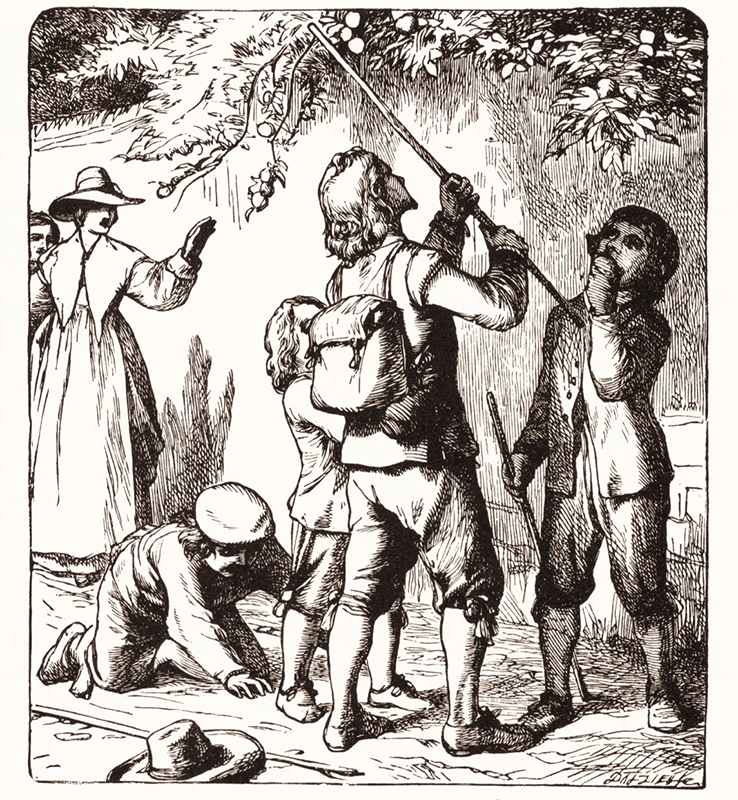Notes and Commentary
by Ken Puls
on John Bunyan's The Pilgrim's Progress
Part Two

20. The Devil's Garden
Notes and Commentary
by Ken Puls
on John Bunyan's The Pilgrim's Progress
Part Two

20. The Devil's Garden
Now there was on the other side of the wall that fenced in the way up which Christiana and her companions were to go, a garden; and that garden belonged to him whose was that barking dog of whom mention was made before. And some of the fruit trees that grew in that garden shot their branches over the wall; and being mellow, they that found them did gather them up, and oft ate of them to their hurt. So Christiana’s boys—as boys are apt to do—being pleased with the trees, and with the fruit that did hang thereon, did pluck them, and began to eat. Their mother did also chide them for so doing; but still the boys went on.
“Well,” said she, “my sons, you transgress; for that fruit is none of ours.” But she did not know that they did belong to the enemy; I'll warrant you if she had, she would have been ready to die for fear. But that passed, and they went on their way.
Notes and Commentary
No sooner had the pilgrims left the comforts of the Gate than they again faced impending danger. When they were approaching the Gate, danger had been evident. The barking of the dog sounded fierce and menacing. But now danger is craftily disguised and dressed up as delight. The pilgrims would not flee from terror, so perhaps they will fall in temptation.
Christiana and her companions see on the other side of the wall a garden, enticing to behold, filled with trees laden with fruit. Everything about the fruit beckons them to indulge. It is “mellow” (pleasant and tasty), plentiful (who would notice if some went missing?), and convenient (the branches of the trees extend over the walls near the pilgrim’s path). But these trees were growing in the enemy’s garden, and Bunyan warns that those who gather their fruit “oft ate of them to their hurt.”
The garden represents the temptations of this world: “the lust of the flesh, the lust of the eyes, and the pride of life” (1 John 2:15–16). It lies on the castle grounds of Beelzebub (the world under the sway of the devil). The fruit trees, though inviting, “belong to the enemy.” They are laden with danger, yet the pilgrims admire them unaware. The fruit trees allude to man’s fall into sin in the Garden of Eden where Satan tempted Eve.
So when the woman saw that the tree was good for food, that it was pleasant to the eyes, and a tree desirable to make one wise, she took of its fruit and ate. She also gave to her husband with her, and he ate (Genesis 3:6).
In Bunyan’s allegory, Christiana’s boys see the fruit hanging over the wall. They desire to have it and so they pluck it and begin to eat. Although Christiana chides them, her scolding isn’t taken seriously and the transgression is soon put out of mind.
The pilgrims’ carelessness at the garden highlights some important lessons when facing temptation.
Continue reading 21. Encounter with Ill-Favored Ones
Return to 19. Christiana's Song
The text for The Pilgrim's Progress
and images used are public domain
Notes and Commentary for Part II ©2014, 2021–2022 Ken Puls
Unless otherwise indicated, all Scripture quotations are from
the New King James Version (NKJV) ©1982 by Thomas Nelson, Inc.
Return to A Guide to John Bunyan's The Pilgrim's Progress Part II
Return to A Guide to John Bunyan's The Pilgrim's Progress Main Index